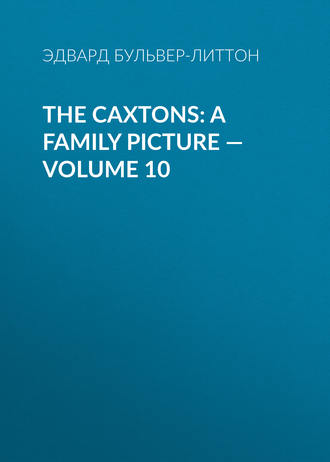
Эдвард Бульвер-Литтон
The Caxtons: A Family Picture — Volume 10
PART X
CHAPTER I
My uncle's conjecture as to the parentage of Francis Vivian seemed to me a positive discovery. Nothing more likely than that this wilful boy had formed some headstrong attachment which no father would sanction, and so, thwarted and irritated, thrown himself on the world. Such an explanation was the more agreeable to me as it cleared up much that had appeared discreditable in the mystery that surrounded Vivian. I could never bear to think that he had done anything mean and criminal, however I might believe he had been rash and faulty. It was natural that the unfriended wanderer should have been thrown into a society, the equivocal character of which had failed to revolt the audacity of an inquisitive mind and adventurous temper; but it was natural also that the habits of gentle birth, and that silent education which English gentlemen commonly receive from their very cradle, should have preserved his honor, at least, intact through all. Certainly the pride, the notions, the very faults of the well-born had remained in full force,— why not the better qualities, however smothered for the time? I felt thankful for the thought that Vivian was returning to an element in which he might repurify his mind, refit himself for that sphere to which he belonged, thankful that we might yet meet, and our present half- intimacy mature, perhaps, into healthful friendship.
It was with such thoughts that I took up my hat the next morning to seek Vivian, and judge if we had gained the right clew, when we were startled by what was a rare sound at our door,—the postman's knock. My father was at the Museum; my mother in high conference, or close preparation for our approaching departure, with Mrs. Primmins; Roland, I, and Blanche had the room to ourselves.
"The letter is not for me," said Pisistratus.
"Nor for me, I am sure," said the Captain, when the servant entered and confuted him,—for the letter was for him. He took it up wonderingly and suspiciously, as Glumdalclitch took up Gulliver, or as (if naturalists) we take up an unknown creature that we are not quite sure will not bite and sting us. Ah! it has stung or bit you, Captain Roland; for you start and change color,—you suppress a cry as you break the seal; you breathe hard as you read; and the letter seems short—but it takes time in the reading, for you go over it again and again. Then you fold it up, crumple it, thrust it into your breast-pocket, and look round like a man waking from a dream. Is it a dream of pain, or of pleasure? Verily, I cannot guess, for nothing is on that eagle face either of pain or pleasure, but rather of fear, agitation, bewilderment. Yet the eyes are bright, too, and there is a smile on that iron lip.
My uncle looked round, I say, and called hastily for his cane and his hat, and then began buttoning his coat across his broad breast, though the day was hot enough to have unbuttoned every breast in the metropolis.
"You are not going out, uncle?"
"Yes, Yes."
"But are you strong enough yet? Let me go with you."
"No, sir; no. Blanche, come here." He took the child in his arms, surveyed her wistfully, and kissed her. "You have never given me pain, Blanche: say,'God bless and prosper you, father!'"
"God bless and prosper my dear, dear papa!" said Blanche, putting her little hands together, as if in prayer.
"There—that should bring me luck, Blanche," said the Captain, gayly, and setting her down. Then seizing his cane from the servant, and putting on his hat with a determined air, he walked stoutly forth; and I saw him, from the window, march along the streets as cheerfully as if he had been besieging Badajoz.
"God prosper thee too!" said I, involuntarily.
And Blanche took hold of my hand, and said in her prettiest way (and her pretty ways were many), "I wish you would come with us, cousin Sisty, and help me to love papa. Poor papa! he wants us both,—he wants all the love we can give him."
"That he does, my dear Blanche; and I think it a great mistake that we don't all live together. Your papa ought not to go to that tower of his at the world's end, but come to our snug, pretty house, with a garden full of flowers, for you to be Queen of the May,—from May to November; to say nothing of a duck that is more sagacious than any creature in the Fables I gave you the other day."
Blanche laughed and clapped her hands. "Oh, that would be so nice! But"—and she stopped gravely, and added, "but then, you see, there would not be the tower to love papa; and I am sure that the tower must love him very much, for he loves it dearly."
It was my turn to laugh now. "I see how it is, you little witch," said I; "you would coax us to come and live with you and the owls! With all my heart, so far as I am concerned."
"Sisty," said Blanche, with an appalling solemnity on her face, "do you know what I've been thinking?"
"Not I, miss—what? Something very deep, I can see,—very horrible, indeed, I fear; you look so serious."
"Why, I've been thinking," continued Blanche, not relaxing a muscle, and without the least bit of a blush—"I've been thinking that I'll be your little wife; and then, of course, we shall all live together."
Blanche did not blush, but I did. "Ask me that ten years hence, if you dare, you impudent little thing; and now, run away to Mrs. Primmins and tell her to keep you out of mischief, for I must say 'Good morning.'"
But Blanche did not run away, and her dignity seemed exceedingly hurt at my mode of taking her alarming proposition, for she retired into a corner pouting, and sat down with great majesty. So there I left her, and went my way to Vivian. He was out; but seeing books on his table, and having nothing to do, I resolved to wait for his return. I had enough of my father in me to turn at once to the books for company; and by the side of some graver works which I had recommended, I found certain novels in French that Vivian had got from a circulating library. I had a curiosity to read these; for except the old classic novels of France, this mighty branch of its popular literature was then new to me. I soon got interested; but what an interest!—the interest that a nightmare might excite if one caught it out of one's sleep and set to work to examine it. By the side of what dazzling shrewdness, what deep knowledge of those holes and corners in the human system of which Goethe must have spoken when he said somewhere,—if I recollect right, and don't misquote him, which I'll not answer for "There is something in every man's heart which, if we could know, would make us hate him,"—by the side of all this, and of much more that showed prodigious boldness and energy of intellect, what strange exaggeration; what mock nobility of sentiment; what inconceivable perversion of reasoning; what damnable demoralization! The true artist, whether in Romance or the Drama, will often necessarily interest us in a vicious or criminal character; but he does not the less leave clear to our reprobation the vice or the crime. But here I found myself called upon, not only to feel interest in the villain (which would be perfectly allowable,—I am very much interested in Macbeth and Lovelace), but to admire and sympathize with the villany itself. Nor was it the confusion of all wrong and right in individual character that shocked me the most, but rather the view of society altogether, painted in colors so hideous that, if true, instead of a revolution, it would draw down a deluge. It was the hatred, carefully instilled, of the poor against the rich; it was the war breathed between class and class; it was that envy of all superiorities which loves to show itself by allowing virtue only to a blouse, and asserting; that a man must be a rogue if he belong to that rank of society in which, from the very gifts of education, from the necessary associations of circumstance, roguery is the last thing probable or natural. It was all this, and things a thousand times worse, that set my head in a whirl, as hour after hour slipped on, and I still gazed, spell-bound, on these Chimeras and Typhons,—these symbols of the Destroying Principle. "Poor Vivian!" said I, as I rose at last; "if thou readest these books with pleasure or from habit, no wonder that thou seemest to me so obtuse about right and wrong, and to have a great cavity where thy brain should have the bump of 'conscientiousness' in full salience!"
Nevertheless, to do those demoniacs justice, I had got through time imperceptibly by their pestilent help; and I was startled to see, by my watch, how late it was. I had just resolved to leave a line fixing an appointment for the morrow, and so depart, when I heard Vivian's knock, —a knock that had great character in it, haughty, impatient, irregular; not a neat, symmetrical, harmonious, unpretending knock, but a knock that seemed to set the whole house and street at defiance: it was a knock bullying—a knock ostentatious—a knock irritating and offensive— impiger and iracundus.
But the step that came up the stairs did not suit the knock; it was a step light, yet firm—slow, yet elastic.
The maid-servant who had opened the door had, no doubt, informed Vivian of my visit, for he did not seem surprised to see me; but he cast that hurried, suspicious look round the room which a man is apt to cast when he has left his papers about and finds some idler, on whose trustworthiness he by no means depends, seated in the midst of the unguarded secrets. The look was not flattering; but my conscience was so unreproachful that I laid all the blame upon the general suspiciousness of Vivian's character.
"Three hours, at least, have I been here!" said I, maliciously.
"Three hours!"—again the look.
"And this is the worst secret I have discovered,"—and I pointed to those literary Manicheans.
"Oh!" said he, carelessly, "French novels! I don't wonder you stayed so long. I can't read your English novels,—flat and insipid; there are truth and life here."
"Truth and life!" cried I, every hair on my head erect with astonishment. "Then hurrah for falsehood and death!"
"They don't please you,—no accounting for tastes."
"I beg your pardon,—I account for yours, if you really take for truth and life monsters so nefast and flagitious. For Heaven's sake, my dear fellow, don't suppose that any man could get on in England,—get anywhere but to the Old Bailey or Norfolk Island,—if he squared his conduct to such topsy-turvy notions of the world as I find here."
"How many years are you my senior," asked Vivian, sneeringly, "that you should play the mentor and correct my ignorance of the world?"
"Vivian, it is not age and experience that speak here, it is something far wiser than they,—the instinct of a man's heart and a gentleman's honor."






